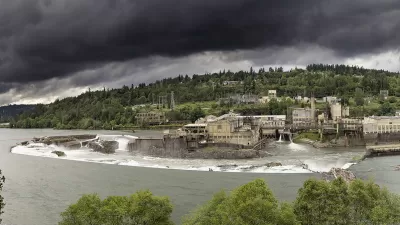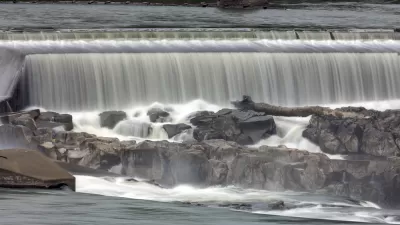There's still a lot to be excited about for the Willamette Falls Legacy Project in Oregon City. A whitewater park just isn't one of them.

"A whitewater park will not be a part of the Willamette Falls Legacy Project in Oregon City," reports Jamie Hale.
Local, regional, and state officials are pinning ambitious redevelopment goals on the Willamette Falls Legacy Project, which Planetizen has been tracking since 2014. The whitewater park idea was scrapped to avoid any potential delays or additional costs for the public Riverwalk from downtown Oregon City to the falls.
Here's how a vision to build a whitewater recreation park takes root:
The whitewater park proposal, a long-time pipe dream from local recreation group We Love Clean Rivers, has generated excitement for its economic potential and recreational appeal. It started to gain traction in April, when the proposal received glowing support from local tourism groups Travel Oregon and Clackamas County Tourism and Cultural Affairs.
The cost of the proposed park, estimated between $12 million to $25 million, proved too high, however. The Oregon Department of Fish and Wildlife also expressed concern for the park's potential to create hazards for salmon migration.
There is hope still that the proposal could someday be a reality. According to Hale, "the Willamette Falls Legacy Project officially announced it was 'rejecting full integration of a whitewater park into the public project,' but remaining open to the idea of 'the whitewater park as a parallel but separate project with no added cost to the Legacy Project.'"
FULL STORY: Willamette Falls project says no to whitewater park

Alabama: Trump Terminates Settlements for Black Communities Harmed By Raw Sewage
Trump deemed the landmark civil rights agreement “illegal DEI and environmental justice policy.”

Planetizen Federal Action Tracker
A weekly monitor of how Trump’s orders and actions are impacting planners and planning in America.

Why Should We Subsidize Public Transportation?
Many public transit agencies face financial stress due to rising costs, declining fare revenue, and declining subsidies. Transit advocates must provide a strong business case for increasing public transit funding.

Understanding Road Diets
An explainer from Momentum highlights the advantages of reducing vehicle lanes in favor of more bike, transit, and pedestrian infrastructure.

New California Law Regulates Warehouse Pollution
A new law tightens building and emissions regulations for large distribution warehouses to mitigate air pollution and traffic in surrounding communities.

Phoenix Announces Opening Date for Light Rail Extension
The South Central extension will connect South Phoenix to downtown and other major hubs starting on June 7.
Urban Design for Planners 1: Software Tools
This six-course series explores essential urban design concepts using open source software and equips planners with the tools they need to participate fully in the urban design process.
Planning for Universal Design
Learn the tools for implementing Universal Design in planning regulations.
Caltrans
Smith Gee Studio
Institute for Housing and Urban Development Studies (IHS)
City of Grandview
Harvard GSD Executive Education
Toledo-Lucas County Plan Commissions
Salt Lake City
NYU Wagner Graduate School of Public Service




























